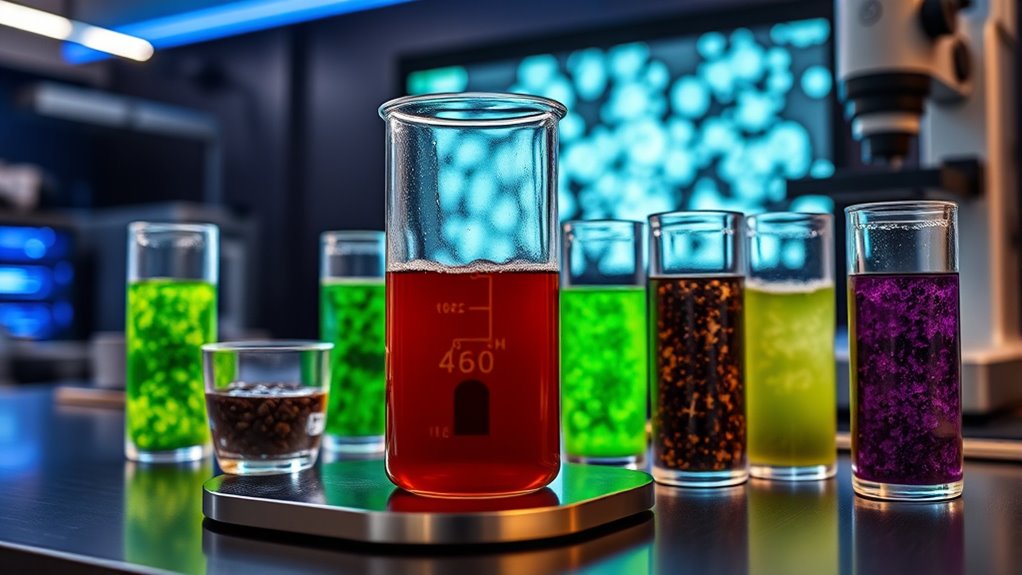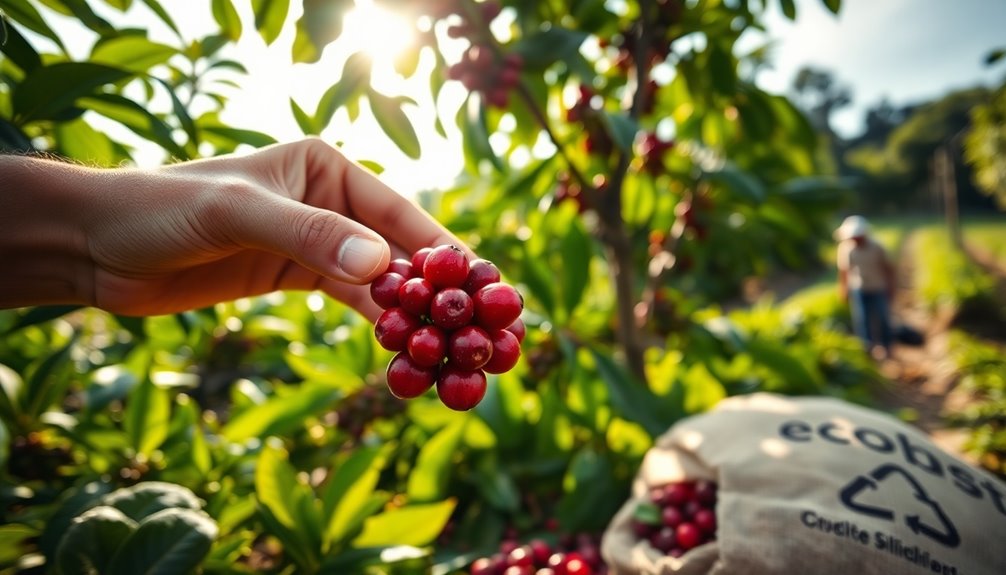Precision fermentation promises a greener alternative to traditional coffee by producing beanless coffee with fewer land and water needs, reducing deforestation and pollution. It uses microbes to create flavors, offering customization and consistency. However, some challenges remain, like winning over consumers and matching the full sensory experience of natural coffee. If you keep exploring, you’ll discover how these innovations could reshape your coffee choices and impact the environment.
Key Takeaways
- Precision fermentation enables sustainable, microbe-based production of coffee flavors, reducing land and water use compared to traditional farming.
- While promising environmentally, consumer acceptance and replicating authentic coffee aroma and mouthfeel remain significant challenges.
- Technological scalability and energy consumption of fermentation processes are critical factors impacting commercial viability.
- Customizable flavor profiles allow innovation, but ensuring these meet the expectations of coffee purists is uncertain.
- Overall, beanless coffee via fermentation offers a scalable, eco-friendly alternative, yet relies on overcoming technological and market acceptance hurdles.

As the coffee industry faces increasing sustainability challenges, innovative solutions like beanless coffee produced through precision fermentation are gaining attention. This technology offers a fresh approach to creating coffee flavors without relying on traditional coffee beans, opening new avenues for flavor innovation. Instead of conventional farming, where land use, water consumption, and pesticide use contribute significantly to environmental degradation, precision fermentation allows producers to craft coffee-like beverages in controlled environments. By mimicking the natural processes that generate coffee’s complex aroma and taste, this method aims to deliver a product that closely resembles traditional coffee, but with a much smaller ecological footprint.
Innovative beanless coffee through precision fermentation offers sustainable flavor creation with a smaller ecological footprint.
With flavor innovation at the forefront, you might wonder how precisely fermented beanless coffee can match the depth and complexity of its bean-based counterpart. Scientists and companies are experimenting with microbial cultures to produce key flavor compounds found in coffee, such as aromatic esters, phenols, and acids. Through this process, they can fine-tune the flavor profile to suit different preferences, from bold and robust to light and delicate. The ability to customize flavors on demand not only broadens consumer choices but also enables the development of coffee experiences that are consistent across batches and free from variability caused by environmental factors. This level of control could revolutionize how you experience coffee, offering a new domain of flavor innovation that’s both sustainable and scalable.
From a sustainability impact perspective, beanless coffee produced through precision fermentation promises notable benefits. Traditional coffee farming often results in deforestation, soil erosion, and high water usage, all of which threaten ecosystems and contribute to climate change. In contrast, fermentation-based production requires minimal land and water, significantly reducing environmental strain. Additionally, since microbial cultures can be cultivated in laboratories or factories, the process is less susceptible to climate variability or pests that plague conventional crops. This means you could enjoy a consistent supply of coffee-like beverages without contributing to deforestation or water shortages.
However, despite these promising advantages, there are still hurdles to overcome. Consumer acceptance of beanless coffee remains uncertain, especially for those deeply attached to the traditional coffee experience. There are also questions about how closely the flavor, aroma, and mouthfeel of fermented coffee can mimic the real thing, and whether it can truly satisfy coffee purists. Furthermore, the energy consumption of fermentation facilities and the scalability of the technology pose challenges that could impact its overall sustainability promise. While it’s an exciting development, the future of beanless coffee through precision fermentation will depend on technological advancements, market acceptance, and ongoing efforts to minimize its environmental footprint.
Frequently Asked Questions
How Sustainable Is Beanless Coffee Production Compared to Traditional Methods?
Beanless coffee production tends to be more sustainable than traditional methods because it reduces environmental impact and enhances resource efficiency. You’ll find it uses fewer land, water, and energy resources, which helps lower carbon emissions. While it’s not completely without environmental concerns, this innovative approach generally offers a greener alternative, allowing you to enjoy coffee with a smaller ecological footprint.
What Are the Potential Health Impacts of Consuming Precision-Fermented Coffee?
Consuming precision-fermented coffee can impact your gut health positively by reducing potential allergens and contaminants often found in traditional coffee. However, there’s a small risk of allergen development or immune reactions if your body reacts to the fermentation byproducts. Overall, it’s generally safe, but you should stay alert for any unusual symptoms. Combining it with a balanced diet supports your gut health and minimizes possible allergen risks.
Can Beanless Coffee Fully Replicate the Flavor Profile of Traditional Coffee?
Yes, beanless coffee can come close to replicating traditional coffee’s flavor profile, but achieving full flavor fidelity remains challenging. You might notice differences in aroma complexity and subtle flavor nuances that are hard to perfectly mimic. While advancements in precision fermentation help craft a convincing taste, some connoisseurs may still detect distinctions in aroma and depth. Overall, it’s a promising alternative, but it might not fully replace the authentic coffee experience for everyone.
What Regulatory Challenges Does Precision Fermentation Face in the Beverage Industry?
You’ll face regulatory challenges in the beverage industry like obtaining approvals and meeting labeling standards. Authorities may scrutinize precision fermentation products for safety, requiring extensive testing and documentation. Clear labeling standards are vital to inform consumers about ingredients and production methods, but these regulations vary by region and can be complex. Managing these hurdles demands proactive engagement with regulators to guarantee your products comply and gain market acceptance.
How Scalable Is the Technology for Widespread Commercial Adoption?
You wonder if precision fermentation can truly go mainstream. While the technology shows promise, scalability challenges remain, especially in developing robust production infrastructure. As demand grows, scaling up without compromising quality or increasing costs is tricky. But with ongoing innovations, you might see this breakthrough become more widespread, transforming your beverage choices. The key lies in overcoming these hurdles, making precision fermentation a reliable, scalable solution for mass-market products.
Conclusion
As you explore beanless coffee and precision fermentation, remember that innovation is a double-edged sword. While it promises sustainability and new flavors, it also carries risks of overreach and unintended consequences. Like a tightrope walker balancing above, you must weigh the potential benefits against the pitfalls. Embrace progress thoughtfully, knowing that every breakthrough shapes the future—just as every step on a journey defines where you’ll eventually arrive.









